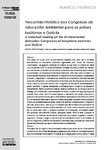Mostrar o rexistro simple do ítem
Percorrido histórico dos Congresos de Educación Ambiental para os países lusófonos e Galicia
| dc.contributor.author | Vales, Carlos | |
| dc.date.accessioned | 2020-06-01T08:35:20Z | |
| dc.date.available | 2020-06-01T08:35:20Z | |
| dc.date.issued | 2019 | |
| dc.identifier.citation | Vales Vázquez, C. (2019). Percorrido histórico dos Congresos de Educación Ambiental para os países lusófonos e Galicia. AmbientalMENTEsustentable, 26(1-2), 23-33. https://doi.org/10.17979/ams.2019.26.1-2.6546 | es_ES |
| dc.identifier.issn | 1887-2417 | |
| dc.identifier.uri | http://hdl.handle.net/2183/25661 | |
| dc.description.abstract | [Resumo] Este artigo ten a súa orixe na presentación realizada polo autor nas II Xornadas Internacionais de Educación Ambiental organizadas polo Centro de Extensión Universitaria e Divulgación Ambiental de Galicia, na súa sede no Castelo de Santa Cruz en abril de 2018. Os obxectivos destas Xornadas era crear un marco de reflexión sobre a historia e os desafíos da Educación Ambiental como ferramenta para contribuír á sostibilidade e á mellora da problemática ambiental, reflexionar sobre o estado e os problemas da Educación Ambiental tanto en Galicia como noutros países con afinidades culturais e linguísticas e robustecer as relacións de cooperación internacional para aumentar a eficacia do uso da Educación Ambiental como ferramenta de intervención social. Faise un percorrido histórico dos Congresos de Educación Ambiental para os países lusófonos e Galicia, destacando a relevancia dese I Congreso de Educación Ambiental dos Países Lusófonos e Galicia, onde por primeira vez, se consigue reunir en Santiago de Compostela, a representantes de todos os países de lingua portuguesa, incluída Timor Leste. Esto foi posible gracias a implicación de moitas institucións e gobernos, de expertos de Educación Ambiental de moitos países e ao esforzo do CEIDA por incorporar a intelectuais e expertos doutras disciplinas coa intención de enriquecer o discurso de transformación social. Despois de describir a historia deste I Congreso e das súas repercusións, entre as que se destaca a de dar formación a responsables de áreas protexidas do mundo lusófono africano e do Timor Leste, continúa o percorrido ate os nosos días, onde o Congreso Lusófono ten conseguido consolidarse diante dos gobernos dos diferentes países, amosando tamén como a Rede Lusófona se converteu nun referente na Educación Ambiental neste espazo xeográfico, cultural e lingüístico. Conclúe o artigo cunha serie de recomendacións sobre a necesidade de que os Congresos Lusófonos de Educación Ambiental sexan un espazo de creación de intelixencia colectiva e de apoio á intervención socioambiental. | es_ES |
| dc.description.abstract | [Abstract] This paper has its origins in the presentation made by the author at the II International Conference on Environmental Education organized by the Center for University Extension and Environmental Dissemination of Galicia, at its headquarters in the Castle of Santa Cruz in April 2018. The objectives of these Conferences were to create a framework for reflection on the history and challenges of Environmental Education as a tool to contribute to sustainability and improvement of environmental issues, reflect on the state and problems of Environmental Education both in Galicia and in other countries with cultural and linguistic affinities and strengthen international cooperation to increase the effectiveness of the use of Environmental Education as a tool for social intervention. In this context, the author makes a historical reading of the Environmental Education Congresses for the lusophone countries and Galicia, for the need to contribute to the history of these congresses from a biographical perspective and help to understand the real origin of these congresses. The author of the article points out the relevance of this I Congress of Environmental Education of the Lusophone Countries and Galicia, where for the first time, it is possible to meet in Santiago de Compostela, representatives of all lusophone countries, including East Timor. This was made possible thanks to the involvement of many institutions and governments, Environmental Education experts from many countries and CEIDA’s effort to incorporate intellectuals and experts from other disciplines with the intention of enriching the discourse of social transformation. After describing the history of this first Congress and its repercussions, including the training of the managers of protected areas in the lusophone african continent and East Timor, he continues his reading to the present day, where this Congress has managed to consolidate behind the governments of the different countries, also showing how the Lusophone Network has become a reference in Environmental Education in this geographical, cultural and linguistic area. The paper concludes with some recommendations on the need for the Lusophone Congresses on Environmental Education to be a place for the creation of collective intelligence and support for socioenvironmental intervention. | es_ES |
| dc.language.iso | por | es_ES |
| dc.publisher | Universidade da Coruña, Servizo de Publicacións | es_ES |
| dc.relation.uri | https://doi.org/10.17979/ams.2019.26.1-2.6546 | es_ES |
| dc.rights | Atribución-CompartirIgual 4.0 España | es_ES |
| dc.rights.uri | http://creativecommons.org/licenses/by-sa/3.0/es/ | * |
| dc.subject | Educación ambiental | es_ES |
| dc.subject | Rede lusófona | es_ES |
| dc.subject | Hstoria | es_ES |
| dc.subject | Alianzas | es_ES |
| dc.subject | Sociedade civil | es_ES |
| dc.subject | Environmental education | es_ES |
| dc.subject | Lusophone network | es_ES |
| dc.subject | History | es_ES |
| dc.subject | Alliances | es_ES |
| dc.subject | Civil society | es_ES |
| dc.title | Percorrido histórico dos Congresos de Educación Ambiental para os países lusófonos e Galicia | es_ES |
| dc.title.alternative | A historical reading on the Environmental Education Congresses of lusophone countries and Galicia | es_ES |
| dc.type | info:eu-repo/semantics/article | es_ES |
| dc.rights.access | info:eu-repo/semantics/openAccess | es_ES |
| UDC.journalTitle | AmbientalMente Sustentable: Revista científica galego-lusófona de educación ambiental | es_ES |
| UDC.volume | 26 | es_ES |
| UDC.issue | 1-2 | es_ES |
| UDC.startPage | 23 | es_ES |
| UDC.endPage | 33 | es_ES |






